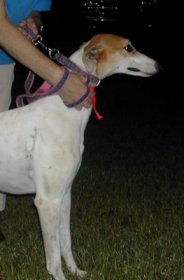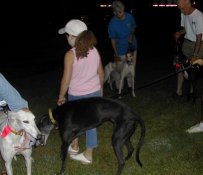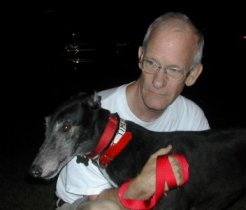Making a Difference
By Kelley Hunsicker
The telephone rang at 3:00 a.m. It
was Debbie Cone, a volunteer for Greyhound Pets of America-South
Carolina (GPA-SC). The dogs were an hour away.
I woke my eight-year-old daughter, who
wanted to come along, and we threw on hats, blue jeans and old
T-shirts. We had ten minutes to meet with Debbie and her husband,
Bill. We were riding with them for the 35-minute drive to get
the retired racers. During the drive, Debbie and Bill explained
the process of receiving retired racing greyhounds and getting
them ready for adoption.
"They always come in this early,"
she said.† "It's cooler at night and less stressful
to the dogs."
I found they make these early morning
trips once a month -- and sometimes drive hours to get the dogs.
 |
"It depends
on where the dogs are going. The drivers pull off the
highway at a designated spot along their delivery route,
unload the dogs and then head out to make more deliveries,"
Debbie explained. "Three weeks ago, we had to be
in Darien, Georgia by eight a.m."
Bill and Debbie are volunteers.
After receiving the dogs and driving them to their temporary
foster homes, they have to go to their paying jobs. Needless
to say, they don't get much sleep on the nights that dogs
arrive.
For Debbie and Bill, the volunteers
of GPA-SC, and volunteers like them nationwide, this is
a way of life. They spend weekends educating the public
about greyhounds. They spend hours at pet stores doing
"meet 'n' greets," have fund-raisers and speak
at conferences about the dogs.
|
"Why do you do it?" I asked.
"If not us, then who?" Debbie
asked matter-of-factly.† She and Bill are passionate about
what they do. They adopted their first greyhound in '97 and
have been a part of the organization since then. They now own
three greyhounds and provide foster care for incoming dogs.
"How well do they adjust to home
life after racing?" I asked. "Do they make good pets?"
"They adjust well," Debbie
said. "Greyhounds are sociable and friendly and make great
companion dogs."
She explained that even though greyhounds
are fast (the fastest dogs in the world), they are short-distance
sprinters and prefer to spend their time lounging on the couch.
Most have low energy levels, are not barkers and are friendly
animals. They make perfect pets for the elderly, apartment dwellers
and anyone who wants a companion. She said, "If you want
a dog to run with
or play catch, then you should probably look for a different
breed of dog."
I was skeptical about the nature of these
dogs. Especially considering the life they had just left.
"How long are they in foster homes
before placement and what do they need to learn while they're
there?" I asked.
"The dogs usually spend three to
four weeks in foster care before placement. They have to be
cat, dog and child tested. We want to make their transition
to pet life a smooth one. We also evaluate the dogs for shyness
and energy level." Debbie explained they do this to ensure
the dogs and their new owners fit well together.
"Greyhounds are sight hunters. Some
do well with cats and small animals while others chase them.
And some greyhounds have a higher energy level than others."
As part of the adoption process, the
volunteers visit the homes of potential adopters. They check
the noise level, see if there is a fenced yard available (though
not necessary) and look for household items that might seem
strange to the dogs.
|
The
dogs have never seen a pool of water and assume they can
walk on the water's surface. They have never seen ceiling
fans, sliding glass doors, heard dishwashers, used stairs
or steps and have never been alone. The dogs are introduced
to these while in foster care.
"What condition
are the dogs in when you receive them?" Having read
so much about the abuse of retired racers, I had to ask. |
 |
"The dogs we receive are in good
shape. We are working hard to establish good relationships with
dog tracks, kennels and owners. We don't want to say anything
negative. We want them to trust us. If they trust us, they will
continue to contact us to donate their dogs. This gives them
options -- other than euthanasia."
She did add that she is not going to
say the abuse doesn't exist. But while dog racing is legal,
it may always exist. GPA is about finding solutions. Volunteers
visit tracks and work with owners to place retired dogs. One
of the biggest problems for owners is not having a place for
the dogs once their racing careers are over.
We finally arrived at our destination.
Now I would see the condition of the greyhounds, how they were
transported and their mannerisms.
We waited. Another SUV pulled up with
two more volunteers and two more kennels. The two women got
out and joined us. There was an excitement in the conversation
as we waited for the hauler.
"Here they come." Bill pointed
to a low, silver trailer descending the exit ramp.
I watched excitedly as the brightly lit
trailer drove past the Waffle House and turned onto the street
towards the lot where we waited.
It was beautiful and new! Debbie explained
how their group (and many others) had donated money for its
purchase so the dogs wouldn't get hot while traveling. She proudly
pointed out their group's name, printed on the back.
The air-conditioned trailer had straw
on the bottom of the compartments for comfort and each compartment
had water for the dogs.
After some paper-signing, the drivers
unloaded the dogs -- two females and two males. The drivers
went in to the Waffle House for coffee-to-go and drove away
again.
The dogs seemed fine from their journey.
They were alert and eagerly sniffing the ground, while leading
the GPA-SC volunteers around the lot. They knew one another
and stopped often to display their affection.
They were friendly, even in the presence
of strangers and welcomed the attention, pushing their bodies
into the volunteers. My daughter and I couldn't resist petting
these sleek, muscled beauties.
"Do you see how thin and muscled
these dogs are?" Debbie asked. "Ours look nothing
like this. Once they become pets, they lose their muscle tone
and put on weight."
It was at that moment (or maybe when
I was petting one of the greyhounds) that everything Debbie
told me made sense. By the GPA volunteers providing solutions,
these dogs were now going into loving homes. I could see why
these volunteers spend so much time educating the public about
greyhounds and work tirelessly to find them new homes.
The dogs were healthy. They were friendly.
And they were beautiful. Now it was time to deliver them to
the foster homes and begin introducing them to pet life.
If you would like to learn more about
this organization, provide a foster home, adopt a greyhound
or give a donation, visit www.floridagreyhounds.com.
There is a page on this site that lists all the
local organizations nationwide.



